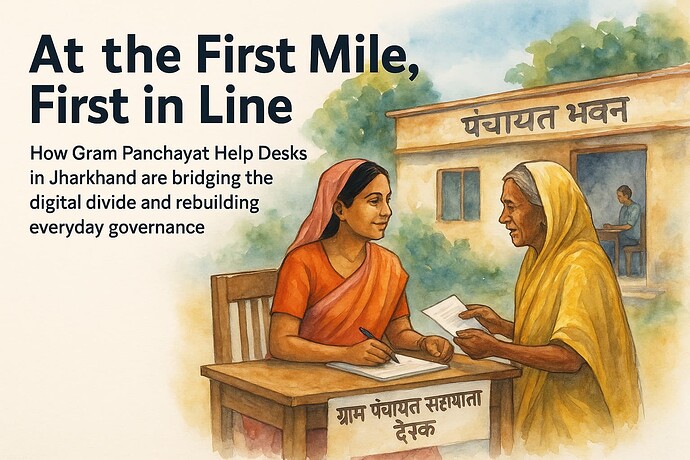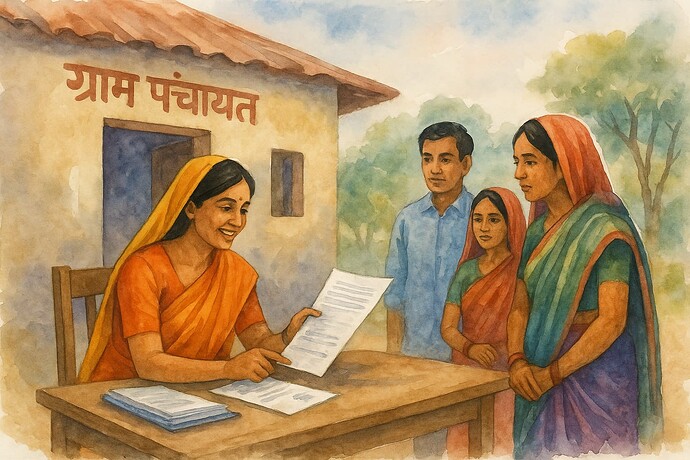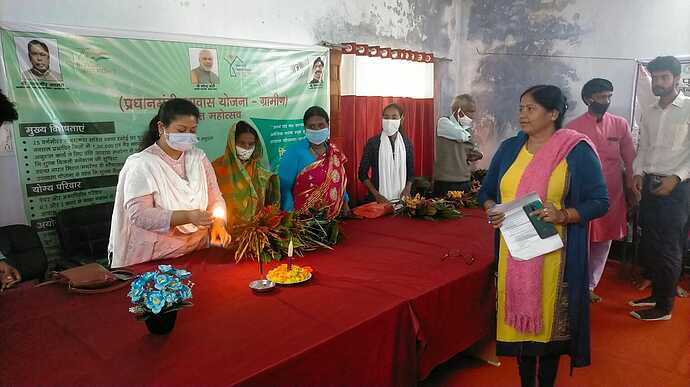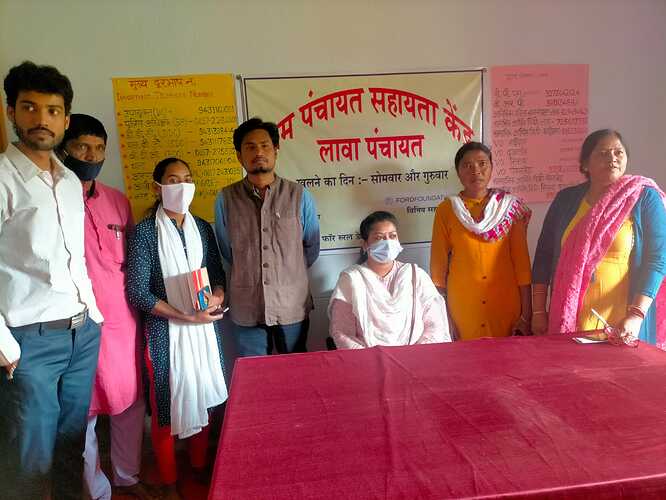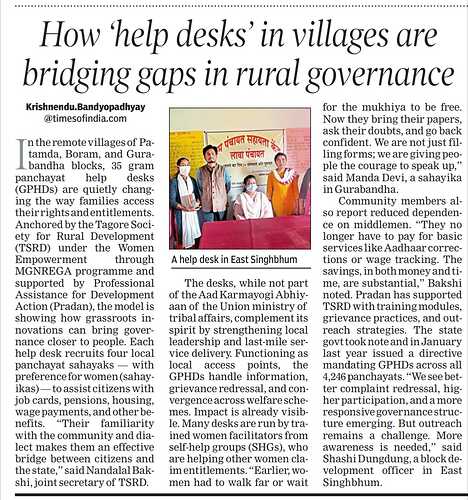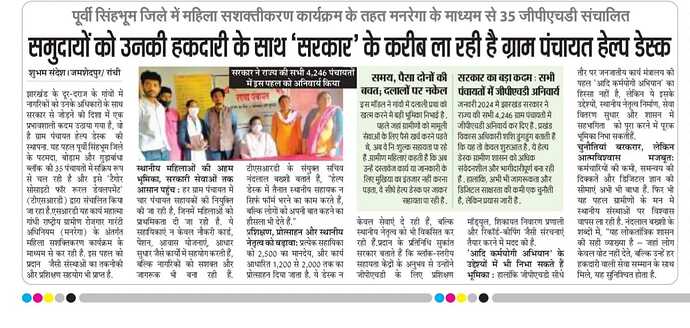How Gram Panchayat Help Desks in Jharkhand are bridging the digital divide and rebuilding everyday governance
35 Gram Panchayat Help Desks (GPHD), now operational in East Singhbhum, are improving rural access to entitlements and offering potential synergies with the objectives of the Aadi Karmayogi Abhiyan.
In the remote villages of East Singhbhum, Jharkhand, 35 Gram Panchayat Help Desks (GPHDs) are quietly transforming the way rural families access their rights and entitlements.
The initiative has taken root across three blocks (Patamda, Boram, and Gurabandha) in East Singhbhum, anchored by the Tagore Society for Rural Development (TSRD), a partner organisation of the Common Ground Initiative, under the “Women Empowerment through Mahatma Gandhi National Rural Employment Guarantee Act (MGNREGA)” programme.
Common Ground partner Professional Assistance for Development Action (PRADAN) has supported the initiative with field-building expertise, under a model focusing on wider social welfare. Under the programme, each gram panchayat will recruit four ‘Panchayat sayahaks’ from a pool of volunteers already working in the area. In the absence of such volunteers, the panchayat will work with the Gram Sabha to recruit such sahayaks, with preference given to women (sahayikas).
## Bringing governance closer
Each desk is staffed by a local sahayak who assists community members with job cards, wage payments, pensions, housing, and more. Their familiarity with the community and local dialect makes them an effective bridge between citizens and the state, according to TSRD.
The help desks also support the objectives of the Ministry of Tribal Affairs’ Aadi Karmayogi Abhiyan, which aims to transform tribal governance in India by building local leadership and improving last-mile service delivery. The desks are not a part of this programme, but complement it through Sahayata Kendras. By serving as local access points for information, grievance redressal, and entitlements, they can strengthen community participation, facilitate convergence across schemes, and enhance the overall effectiveness of service delivery.
Recognising the potential of these Help Desks, the Government of Jharkhand issued a statewide directive in January 2024 mandating GPHDs in all 4,246 Panchayats. As per the Government’s order (letter no 584, dated 11.03.25), each Gram Panchayat (GP) will recruit 4 Panchayat Sayahaks. They will be mostly from Panchayat Volunteers already working in that GP. If such people are not working, then GP, with the support of Gram Sabha, shall recruit people, in which preference will be given to women. Their remuneration is 2500 per month, and they shall be working 10 am to 5 pm for all the working days (2 panchayat sahayaks shall work for 4 hours in each half – total 4 sahayaks will be recruited.
“It is just the beginning. There is potential for these Help Desks to truly benefit the people. We see better complaint redressal, higher community participation, and a more responsive governance structure emerging. However, there is still a lack of adequate awareness and outreach. More needs to be done to ensure that the Panchayat system can reach everyone who needs support,” said Shashi Dungdung, Block Development Officer, East Singhbhum, who has facilitated coordination with Rozgar Sevaks (village-level employment assistants) and local leaders.
## The Need
The need for such help desks arises from longstanding gaps in local governance. Despite two rounds of Panchayat elections in the past decade, the functioning of institutions like Gram Sabhas remains limited. Women and marginalised communities often do not participate, and community members are sometimes unclear about the roles and responsibilities of elected representatives.
In this vacuum, informal actors (middlemen or private agents) fill the gap, charging fees and further complicating access. Help desks address this challenge by making official support visible, available, and free at the local level.
## Women at the centre
GPHDs being operated by trained women facilitators, who are members of local Self-Help Groups (SHGs), have been serving as vital access points for rural citizens, especially women, to obtain information and assistance related to MGNREGA, pensions, housing, and other welfare schemes. According to TSRD, by positioning women at the forefront of these facilitation centers, the initiative not only enhances the delivery of government services but also empowers women to take active roles in local governance and community development.
“Community members report that they no longer have to pay for basic services such as correcting Aadhaar details or tracking MGNREGA wages,” says Nandalal Bakshi from TSRD. “The savings, both in money and time, have been substantial.”
The GPHDs also organise community awareness camps, read the Constitution’s preamble, and explain welfare schemes. “Earlier, women had to walk far or wait for the mukhiya (village head) to be free. Now they come to us directly. They bring their papers, ask their doubts, and go back feeling confident. We are not just filling forms; we are giving people the courage to speak up,” said Manda Devi, a GPHD sahayika.
## The GPHD Design
The design of the GPHD has been informed by exposure visits and field inputs from PRADAN, which has played a key role in shaping the operating structure. “Drawing from its earlier experience with block-level Sahayata Kendras, PRADAN has contributed to the development of training modules, record-keeping formats, grievance redressal practices, and methods for community outreach. These frameworks have helped TSRD refine its implementation in the field, where the emphasis remains on consistency, credibility, and responsiveness,” said Sukanta Sarkar from PRADAN.
While TSRD’s model of the Gram Panchayat Help Desk was promoted with MGNREGS as the primary anchor, PRADAN’s approach was framed more broadly around social welfare, with MGNREGS as one of several components. Over time, TSRD’s model also expanded to connect with other schemes. In practice, most GPHDs have two members who alternate between sitting in the panchayat office and conducting field visits, together covering about four days a week, with each member receiving 16 days of semi-skilled wages under MGNREGS.
Each GPHD operates with a monthly honorarium of ₹2,500 for the community representative, along with performance incentives ranging from ₹1,200 to ₹2,000 based on deliverables such as forms processed and grievances resolved.
## Challenges remain
Challenges such as staffing gaps, limited digital literacy, and coordination issues persist, but the Help Desks have already shown that small, consistent efforts can rebuild faith in local institutions. At times, there is also resistance to decentralised ownership or a lack of coordination between SHGs, line departments, and Panchayat secretaries.
For the model to achieve scale, there is a need for a clear and consistent line of funding from the state to sustain the functioning of GPHDs, creating the basis for wider adoption within Jharkhand and offering a pathway for replication in other states. In this case, the government has committed to providing the monthly remuneration for sahayaks and sahayikas directly, ensuring continued support for the 35 Gram Panchayat Help Desks currently in operation.
As the model expands, ongoing training, peer learning, and partnerships with Pragya Kendras (citizen service centers) and line departments are essential for sustainability. The approach calls for the importance of community-led models in strengthening grassroots governance and promoting gender equity in rural areas.
READ MORE ABOUT THE GPHDs IN ENGLISH and HINDI
In the Media
The initiative around the GPHDs received attention in the media, with coverage highlighting their role in linking communities to welfare schemes and strengthening local governance.
Times of India: How âhelp desksâ in villages are bridging gaps in rural governance | Ranchi News - The Times of India
Dainik Bhaskar
Shubham Sandesh
